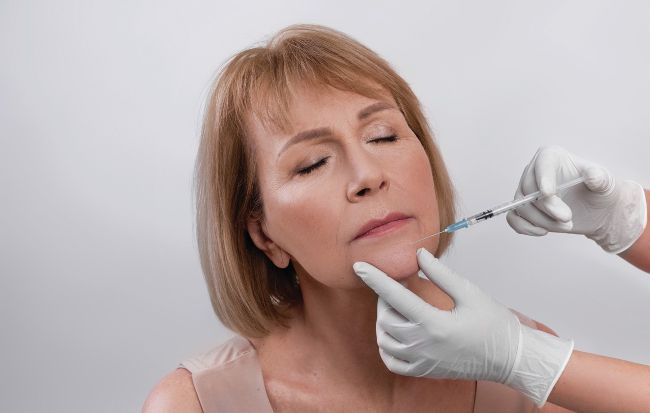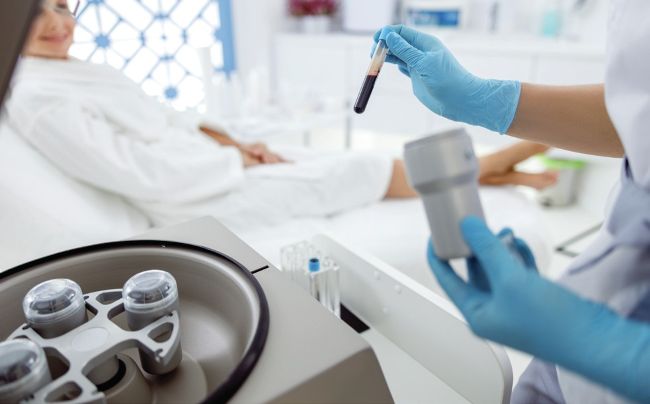FEATURES
The princess and the PRP
Regenerative expert, nurse Claudia McGloin answers all your burning questions
“DOES AGE AFFECT PLATELET-RICH PLASMA TREATMENT?”
Given platelet-rich plasma’s (PRP) regenerative nature, questions often arise about how age might influence its effectiveness. As people age, the body undergoes several changes, such as decreased stem cell function and slower tissue repair which could potentially impact the quality of platelets and growth factors present in the plasma. But does age truly affect the success of PRP treatments?
PRP is widely recognised for its ability to rejuvenate the skin, reduce wrinkles and improve overall skin texture. The treatment works by harnessing the body’s natural healing processes. Platelets and growth factors concentrated in the PRP stimulate the production of collagen and other essential components, leading to firmer healthier skin.
A recent study focused on facial rejuvenation demonstrated that PRP successfully stimulated collagen production and improved skin quality across different age groups, including patients in their 30s, 40s, 50s, and 60s. Interestingly, the study found no significant differences in the outcomes across these age groups. This suggests that age does not have a major impact on the effectiveness of PRP treatments for skin rejuvenation. Even though age-related changes in stem cell activity and growth factor production are expected, these factors do not appear to significantly hinder PRP’s ability to improve skin appearance.
While PRP is highly successful in aesthetic treatments, its use in orthopaedics, particularly for musculoskeletal conditions such as arthritis and tendon injuries, raises more questions about how age may influence its effectiveness. Research has shown that PRP can help heal soft tissue injuries, promote cartilage regeneration, and reduce inflammation. However, when it comes to patients with degenerative conditions, such as advanced osteoarthritis, the results are less predictable.

Studies from the American College of Rheumatology and the Osteoarthritis Research Society International suggest that PRP therapy remains beneficial for older patients with early-stage osteoarthritis. In these cases, PRP can alleviate pain, improve joint function and slow disease progression. However, for individuals with more advanced joint degeneration, the benefits of PRP therapy may be limited. As we age, the body’s ability to regenerate tissue declines, making it more difficult for PRP to repair the extensive damage seen in advanced stages of osteoarthritis.
That said, PRP is not a one-size-f its-all treatment that needs to be addressed on a 360-degree approach to health and wellness for the older patient. Over the last few years, I have seen some amazing results with patients in their late 60s experiencing advanced stages of osteoarthritis. This is also down to the kit and centrifuge used as not all PRP is the same!
So, while PRP therapy has proven to be a valuable treatment option in both aesthetic and medical fields such as orthopaedics, there is still so much to learn. Further research is necessary to better understand how PRP functions in patients of different ages, especially those with advanced degenerative conditions. Understanding the underlying mechanisms of PRP’s regenerative effects could help refine its protocols, enhancing its application for older individuals and those with severe conditions. In addition, as there is no universal protocol for PRP treatments, we need to further investigate this. Future studies may explore how modifying PRP treatment protocols could improve its effectiveness in older patients. This might include adjusting the concentration of platelets or combining PRP with other therapies to enhance its regenerative properties, especially in orthopaedic applications.

If you have questions regarding any aspect of regenerative medicine – PRP, PPP, PRF, polynucleotides, exosomes – or questions relating to treatments, please get in touch, either by contacting Aesthetic Medicine magazine or emailing claudia@thenewyouclinic.ie.
CLAUDIA MCGLOIN
Claudia McGloin is a registered nurse and holds dual registration in both the UK and Ireland. With over 27 years’ nursing experience, McGloin is the clinical director and nurse practitioner at The New You Clinic in Sligo. She is one of Ireland’s leading platelet-rich plasma experts and has performed thousands of PRP treatments. She has shared her expertise on the international stage and in various publications.